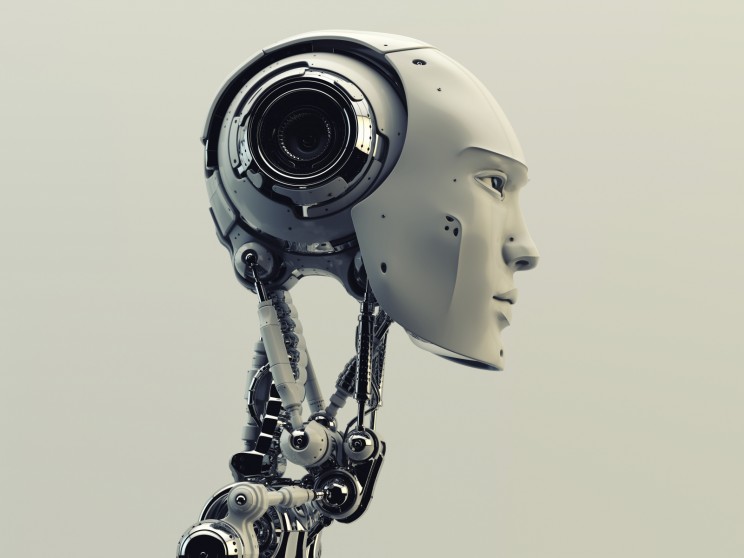new posts in all blogs
Viewing: Blog Posts Tagged with: artificial intelligence, Most Recent at Top [Help]
Results 1 - 15 of 15
How to use this Page
You are viewing the most recent posts tagged with the words: artificial intelligence in the JacketFlap blog reader. What is a tag? Think of a tag as a keyword or category label. Tags can both help you find posts on JacketFlap.com as well as provide an easy way for you to "remember" and classify posts for later recall. Try adding a tag yourself by clicking "Add a tag" below a post's header. Scroll down through the list of Recent Posts in the left column and click on a post title that sounds interesting. You can view all posts from a specific blog by clicking the Blog name in the right column, or you can click a 'More Posts from this Blog' link in any individual post.

By: Helena Palmer,
on 1/28/2016
Blog:
OUPblog
(
Login to Add to MyJacketFlap)
JacketFlap tags:
Books,
robots,
Technology,
Philosophy,
robotics,
mathematics,
artificial intelligence,
STEM,
Digital Age,
ai,
*Featured,
Nick Bostrom,
Science & Medicine,
Science and Technology,
John Searle,
scientific progress,
Advances in Technology,
AI Technology,
sentient robots,
chinese room argument,
computer consciousness,
z-consciousness,
Add a tag
There has been much recent talk about a possible robot apocalypse. One person who is highly skeptical about this possibility is philosopher John Searle. In a 2014 essay, he argues that "the prospect of superintelligent computers rising up and killing us, all by themselves, is not a real danger".
The post Does the ‘Chinese room’ argument preclude a robot uprising? appeared first on OUPblog.

By: Charley,
on 1/23/2016
Blog:
OUPblog
(
Login to Add to MyJacketFlap)
JacketFlap tags:
Technology,
Journals,
Justin Richards,
it,
Mathematics,
artificial intelligence,
computer science,
computing,
ai,
cyber security,
*Featured,
Science & Medicine,
information technology,
The Computer Journal,
BCS,
Steve Furber,
The Chartered Institute for IT,
University of Manchester,
Add a tag
Oxford University Press is excited to be welcoming Professor Steve Furber as the new Editor-in-Chief of The Computer Journal. In an interview between Justin Richards of BCS, The Chartered Institute of IT and Steve, we get to know more about the SpiNNaker project, ethical issues around Artificial Intelligence (AI), and the future of the IT industry.
The post Conversations in computing: Q&A with Editor-in-Chief, Professor Steve Furber appeared first on OUPblog.

By: Helena Palmer,
on 1/22/2016
Blog:
OUPblog
(
Login to Add to MyJacketFlap)
JacketFlap tags:
Books,
robots,
Technology,
Philosophy,
robotics,
mathematics,
artificial intelligence,
consciousness,
STEM,
Digital Age,
ai,
*Featured,
Science & Medicine,
Science and Technology,
John Searle,
scientific progress,
Advances in Technology,
AI Technology,
sentient robots,
chinese room argument,
David Chalmers,
computer consciousness,
CTOM,
Add a tag
Can a robot be conscious? I will try to discuss this without getting bogged down in the rather thorny issue of what consciousness –– really is. Instead, let me first address whether robot consciousness is an important topic to think about. At first sight, it may seem unimportant. Robots will affect us only through their outward behavior, which may be more or less along the lines of what we tend to think of as coming along with consciousness, but given this behavior, its consequences to us are not affected by whether or not it really is accompanied by consciousness.
The post Can a robot be conscious? appeared first on OUPblog.

By: Helena Palmer,
on 1/15/2016
Blog:
OUPblog
(
Login to Add to MyJacketFlap)
JacketFlap tags:
Nick Bostrom,
Science and Technology,
synthetic biology,
scientific progress,
Here be dragons,
Advances in Technology,
AI Technology,
Max Tegmark,
Olle Häggström,
Books,
Technology,
robotics,
mathematics,
bill gates,
artificial intelligence,
Digital Age,
ipcc,
ai,
*Featured,
Science & Medicine,
STEM,
Stephen Hawking,
nanotechnology,
Add a tag
There is a widely held conception that progress in science and technology is our salvation, and the more of it, the better. This is the default assumption not only among the general public, but also in the research community including university administration and research funding agencies, all the way up to government ministries. I believe the assumption to be wrong, and very dangerous.
The post Let us not run blindfolded into the minefield of future technologies appeared first on OUPblog.

By:
[email protected],
on 8/31/2015
Blog:
Perpetually Adolescent
(
Login to Add to MyJacketFlap)
JacketFlap tags:
Books,
book review,
NSA,
artificial intelligence,
hacking,
hackers,
chuck wendig,
Book Reviews - Fiction,
zeroes,
cyber spies,
zer0es,
Add a tag
I am a huge fan of Chuck Wendig’s Miriam Black series so when I saw he had a new book coming out I had to read it. On the surface this appears to be a cyber-thriller about hacking. But in the hands of Chuck Wendig it goes somewhere quite different. The book opens and we are […]

By: Connie Ngo,
on 9/8/2014
Blog:
OUPblog
(
Login to Add to MyJacketFlap)
JacketFlap tags:
artificial intelligence,
*Featured,
Nick Bostrom,
philosophy of science,
superintelligence,
Books,
robots,
Technology,
Philosophy,
machines,
robotics,
Add a tag
From mechanical turks to science fiction novels, our mobile phones to The Terminator, we’ve long been fascinated by machine intelligence and its potential — both good and bad. We spoke to philosopher Nick Bostrom, author of Superintelligence: Paths, Dangers, Strategies, about a number of pressing questions surrounding artificial intelligence and its potential impact on society.
Are we living with artificial intelligence today?
Mostly we have only specialized AIs – AIs that can play chess, or rank search engine results, or transcribe speech, or do logistics and inventory management, for example. Many of these systems achieve super-human performance on narrowly defined tasks, but they lack general intelligence.
There are also experimental systems that have fully general intelligence and learning ability, but they are so extremely slow and inefficient that they are useless for any practical purpose.
AI researchers sometimes complain that as soon as something actually works, it ceases to be called ‘AI’. Some of the techniques used in routine software and robotics applications were once exciting frontiers in artificial intelligence research.
What risk would the rise of a superintelligence pose?
It would pose existential risks – that is to say, it could threaten human extinction and the destruction of our long-term potential to realize a cosmically valuable future.
Would a superintelligent artificial intelligence be evil?
Hopefully it will not be! But it turns out that most final goals an artificial agent might have would result in the destruction of humanity and almost everything we value, if the agent were capable enough to fully achieve those goals. It’s not that most of these goals are evil in themselves, but that they would entail sub-goals that are incompatible with human survival.
For example, consider a superintelligent agent that wanted to maximize the number of paperclips in existence, and that was powerful enough to get its way. It might then want to eliminate humans to prevent us from switching if off (since that would reduce the number of paperclips that are built). It might also want to use the atoms in our bodies to build more paperclips.
Most possible final goals, it seems, would have similar implications to this example. So a big part of the challenge ahead is to identify a final goal that would truly be beneficial for humanity, and then to figure out a way to build the first superintelligence so that it has such an exceptional final goal. How to do this is not yet known (though we do now know that several superficially plausible approaches would not work, which is at least a little bit of progress).
How long have we got before a machine becomes superintelligent?
Nobody knows. In an opinion survey we did of AI experts, we found a median view that there was a 50% probability of human-level machine intelligence being developed by mid-century. But there is a great deal of uncertainty around that – it could happen much sooner, or much later. Instead of thinking in terms of some particular year, we need to be thinking in terms of probability distributed across a wide range of possible arrival dates.
So would this be like Terminator?
There is what I call a “good-story bias” that limits what kind of scenarios can be explored in novels and movies: only ones that are entertaining. This set may not overlap much with the group of scenarios that are probable.
For example, in a story, there usually have to be humanlike protagonists, a few of which play a pivotal role, facing a series of increasingly difficult challenges, and the whole thing has to take enough time to allow interesting plot complications to unfold. Maybe there is a small team of humans, each with different skills, which has to overcome some interpersonal difficulties in order to collaborate to defeat an apparently invincible machine which nevertheless turns out to have one fatal flaw (probably related to some sort of emotional hang-up).
One kind of scenario that one would not see on the big screen is one in which nothing unusual happens until all of a sudden we are all dead and then the Earth is turned into a big computer that performs some esoteric computation for the next billion years. But something like that is far more likely than a platoon of square-jawed men fighting off a robot army with machine guns.
If machines became more powerful than humans, couldn’t we just end it by pulling the plug? Removing the batteries?
It is worth noting that even systems that have no independent will and no ability to plan can be hard for us to switch off. Where is the off-switch to the entire Internet?
A free-roaming superintelligent agent would presumably be able to anticipate that humans might attempt to switch it off and, if it didn’t want that to happen, take precautions to guard against that eventuality. By contrast to the plans that are made by AIs in Hollywood movies – which plans are actually thought up by humans and designed to maximize plot satisfaction – the plans created by a real superintelligence would very likely work. If the other Great Apes start to feel that we are encroaching on their territory, couldn’t they just bash our skulls in? Would they stand a much better chance if every human had a little off-switch at the back of our necks?
So should we stop building robots?
The concern that I focus on in the book has nothing in particular to do with robotics. It is not in the body that the danger lies, but in the mind that a future machine intelligence may possess. Where there is a superintelligent will, there can most likely be found a way. For instance, a superintelligence that initially lacks means to directly affect the physical world may be able to manipulate humans to do its bidding or to give it access to the means to develop its own technological infrastructure.
One might then ask whether we should stop building AIs? That question seems to me somewhat idle, since there is no prospect of us actually doing so. There are strong incentives to make incremental advances along many different pathways that eventually may contribute to machine intelligence – software engineering, neuroscience, statistics, hardware design, machine learning, and robotics – and these fields involve large numbers of people from all over the world.
To what extent have we already yielded control over our fate to technology?
The human species has never been in control of its destiny. Different groups of humans have been going about their business, pursuing their various and sometimes conflicting goals. The resulting trajectory of global technological and economic development has come about without much global coordination and long-term planning, and almost entirely without any concern for the ultimate fate of humanity.
Picture a school bus accelerating down a mountain road, full of quibbling and carousing kids. That is humanity. But if we look towards the front, we see that the driver’s seat is empty.
Featured image credit: Humanrobo. Photo by The Global Panorama, CC BY 2.0 via Flickr
The post Nick Bostrom on artificial intelligence appeared first on OUPblog.


By: PennyF,
on 8/29/2014
Blog:
OUPblog
(
Login to Add to MyJacketFlap)
JacketFlap tags:
*Featured,
Nick Bostrom,
Science & Medicine,
superintelligence,
Pastus,
Scronkfinkle,
the unfinished fable of the sparrows,
Technology,
computers,
Philosophy,
artificial intelligence,
Humanities,
Add a tag
Owls and robots. Nature and computers. It might seem like these two things don’t belong in the same place, but The Unfinished Fable of the Sparrows (in an extract from Nick Bostrom’s Superintelligence) sheds light on a particular problem: what if we used our highly capable brains to build machines that surpassed our general intelligence?
It was the nest-building season, but after days of long hard work, the sparrows sat in the evening glow, relaxing and chirping away.
“We are all so small and weak. Imagine how easy life would be if we had an owl who could help us build our nests!”
“Yes!” said another. “And we could use it to look after our elderly and our young.”
“It could give us advice and keep an eye out for the neighborhood cat,” added a third.
Then Pastus, the elder-bird, spoke: “Let us send out scouts in all directions and try to find an abandoned owlet somewhere, or maybe an egg. A crow chick might also do, or a baby weasel. This could be the best thing that ever happened to us, at least since the opening of the Pavilion of Unlimited Grain in yonder backyard.”
The flock was exhilarated, and sparrows everywhere started chirping at the top of their lungs.
Only Scronkfinkle, a one-eyed sparrow with a fretful temperament, was unconvinced of the wisdom of the endeavor. Quoth he: “This will surely be our undoing. Should we not give some thought to the art of owl-domestication and owl-taming first, before we bring such a creature into our midst?”
Replied Pastus: “Taming an owl sounds like an exceedingly difficult thing to do. It will be difficult enough to find an owl egg. So let us start there. After we have succeeded in raising an owl, then we can think about taking on this other challenge.”
“There is a flaw in that plan!” squeaked Scronkfinkle; but his protests were in vain as the flock had already lifted off to start implementing the directives set out by Pastus.
Just two or three sparrows remained behind. Together they began to try to work out how owls might be tamed or domesticated. They soon realized that Pastus had been right: this was an exceedingly difficult challenge, especially in the absence of an actual owl to practice on. Nevertheless they pressed on as best they could, constantly fearing that the flock might return with an owl egg before a solution to the control problem had been found.
Headline image credit: Chestnut Sparrow by Lip Kee. CC BY 2.0 via Flickr.
The post The unfinished fable of the sparrows appeared first on OUPblog.


By:
Jen Robinson,
on 5/19/2014
Blog:
Jen Robinson
(
Login to Add to MyJacketFlap)
JacketFlap tags:
dystopia,
Reviews,
robots,
Young Adult,
young adult fiction,
Newsletter,
artificial intelligence,
Dystopia / Post-Apocalypse,
william campbell powell,
Add a tag
Book: Expiration Day
Author: William Campbell Powell
Pages: 336
Age Range: 12 and up

 Expiration Day is set in a dystopian near-future England a generation after fertility levels have dropped precipitously world-wide. Hardly any babies are born anymore, though most people don't realize how bad the situation is, because they parents are able to purchase uncannily lifelike robotic children. These children don't even know (unless some incident occurs) whether they are human or not.
Expiration Day is set in a dystopian near-future England a generation after fertility levels have dropped precipitously world-wide. Hardly any babies are born anymore, though most people don't realize how bad the situation is, because they parents are able to purchase uncannily lifelike robotic children. These children don't even know (unless some incident occurs) whether they are human or not.
Expiration Day is related primarily as the diary of a girl named Tania, who lives with her parents just outside of London. Tania's diary has somehow been discovered, "encrypted and forgotten, but surviving through uncounted millennia" by someone from a future alien race. His comments and responses to Tania's story are included as brief "intervals" throughout the story. The title refers to the fact that the robot children must be returned to their manufacturer on their 18th birthday - the parents have them only lease.
The world in Expiration Day is reminiscent in tone to that of P.D. James' Children of Men. In Willam Campbell Powell's world, however, the artificial children serve to keep society under control, filling an innate need that people have to form families and pass things along to a future generation (even if that generation expires at age 18).
I found the philosophical underpinnings of Expiration Day thought-provoking. And I quite liked Tania as a character. Parts of the book, which begins when Tania is only 11, drag a little bit, plot-wise. But my concern for Tania's fate kept me reading. The end includes a couple of twists (one of which I'm still trying to wrap my head around), which will keep readers guessing.
One thing that I really liked about Expiration Day was the importance of Tania's father as a character. Not a placeholder, or someone to be rescued, as is a common convention in books, but an intelligent, caring man who puts everything on the line in support of his daughter.
Here are a couple of snippets, to give you a feel for Tania's voice:
"There's a word for legs like mine. Gangly. I count my knees, sometimes, and I know I have just two, one on each leg. But dressed like that, I felt like it was more--a lot more, with different numbers on each leg." (Page 18)
"I love words, though, and I wish I could control them better. Like Humpty Dumpty, to have them line up and do my bidding. So I read, as I said, from Chaucer and Shakespeare, via Dylan Thomas and Rupert Brooke, to Ray Bradbury and Roger Zelazny, and try to see how they get their words to behave." (Page 182)
"Nobody truly dies who shapes another person. Does that make sense, Mister Zog?" (page 227)
Fans of speculative and dystopian fiction, particularly that which questions what makes someone human in the presence of advanced technology (like The Adoration of Jenna Fox), won't want to miss Expiration Day. Tania's participation in a band, and her issues with dating and growing up, are also addressed, and make the book accessible to those who prefer more realistic coming-of-age fiction. For those who need to know, there are discussions about having sex (including a boy who wants to), but no real action to speak of in Expiration Day. This is a book that will stay with me, and made me think. I learned about it from this review at Ms. Yingling Reads.
Publisher: Tor Teen (@TorTeen)
Publication Date: April 22, 2014
Source of Book: Review copy from the publisher
FTC Required Disclosure:
This site is an Amazon affiliate, and purchases made through Amazon links (including linked book covers) may result in my receiving a small commission (at no additional cost to you).
© 2014 by Jennifer Robinson of Jen Robinson's Book Page. All rights reserved. You can also follow me @JensBookPage or at my Growing Bookworms page on Facebook.


By: AlanaP,
on 4/27/2014
Blog:
OUPblog
(
Login to Add to MyJacketFlap)
JacketFlap tags:
Strategies,
artificial intelligence,
Johnny Depp,
mind,
intelligence,
Dangers,
transcendence,
ai,
*Featured,
Nick Bostrom,
Paths,
Science & Medicine,
bostrom,
machine intelligence,
superintelligence,
ykef3fovtby,
86st7_lzs2s,
h9lasfq64e8,
aheywelk_u8,
Books,
movie,
Videos,
Technology,
Philosophy,
Add a tag
In the trailer of Transcendence, an authoritative professor embodied by Johnny Depp says that “the path to building superintelligence requires us to unlock the most fundamental secrets of the universe.” It’s difficult to wrap our minds around the possibility of artificial intelligence and how it will affect society. Nick Bostrom, a scientist and philosopher and the author of the forthcoming Superintelligence: Paths, Dangers, Strategies, discusses the science and reality behind the future of machine intelligence in the following video series.
Could you upload Johnny Depp’s brain?
Click here to view the embedded video.
How imminent is machine intelligence?
Click here to view the embedded video.
Would you have a warning before artificial intelligence?
Click here to view the embedded video.
How could you get a machine intelligence?
Click here to view the embedded video.
Nick Bostrom is Professor in the Faculty of Philosophy at Oxford University and founding Director of the Future of Humanity Institute and of the Program on the Impacts of Future Technology within the Oxford Martin School. He is the author of some 200 publications, including Anthropic Bias, Global Catastrophic Risks, and Human Enhancement. His next book, Superintelligence: Paths, Dangers, Strategies, will be published this summer in the UK and this fall in the US. He previously taught at Yale, and he was a Postdoctoral Fellow of the British Academy. Bostrom has a background in physics, computational neuroscience, and mathematical logic as well as philosophy.
Subscribe to the OUPblog via email or RSS.
Subscribe to only technology articles on the OUPblog via email or RSS.
The post The viability of Transcendence: the science behind the film appeared first on OUPblog.


By: Nicola,
on 3/22/2012
Blog:
OUPblog
(
Login to Add to MyJacketFlap)
JacketFlap tags:
chatbot,
iGod,
jabberwacky,
peter j bentley,
talking to computers,
the science of computers and how it shapes our world,
turing centenary,
neumann,
internet,
Technology,
alan turing,
artificial intelligence,
computer science,
shannon,
ai,
*Featured,
turing,
Science & Medicine,
Digitized,
Peter Bentley,
Add a tag
By Peter J Bentley
What better way to spend an afternoon than having a friendly chat? My three friends are online chatbots – Artificial Intelligence software designed to analyse my sentences and respond accordingly. All I do is visit a specific webpage, then type into a box in my Internet browser and they reply, just like chatting online to a human. These three (jabberwacky, iGod and ALICE) are some of the more advanced chatbots out there, the result of decades of research by computer scientists to try and achieve intelligence in a computer. From the birth of computers until now, we’ve been trying to make a digital brain that’s clever enough to have a conversation with us. The best we can manage is really nothing more than a database of facts, some basic knowledge of grammar, and a lot of symbol-processing – shuffling of words around in an attempt to find some kind of coherent response. Here’s what we said to each other this afternoon.

Conversation 1:
Me: Hello.
Jabberwacky: Hello, how are you?
Me: I would like to have a chat with you about your parents. Would that be OK?
Jabberwacky: What would you like to chat about?
Me: Did you know that Alan Turing would be 100 years old this year, had he lived?
Jabberwacky: That is very interesting. Do you know that the Philippines has 7100 islands?
Me: I did not know that. However, let’s talk about Turing a little more. You know that Turing suggested something called the Turing Test?
Jabberwacky: No, I did not know that the cat was red…
Me: Right. Well, this was Turing’s way of thinking about how we might judge whether we were talking to an intelligent computer. If we can’t tell the difference between chatting to a computer and chatting to a person, the computer passes the Turing Test. It is intelligent, so Turing suggested.
Jabberwacky: We could all be a figment of imagination of some old guy living in an insane asylum if you think about it.
Me: Yes, I guess that might be true. Anyway, the foresight shown by Turing is remarkable. He was thinking of these ideas at the time that computers were still the size of a large room, and could perform just basic computations compared to today’s machines.
Jabberwacky: Well this must be the part of the film where the noted inception noise comes in.
Me: That might be an appropriate soundtrack for this conversation, you are right. But this is not science fiction, this is computer science fact. It’s a little sad that Turing predicted: “I believe that at the end of the century the use of words and general educated opinion will have altered so much that one will be able to speak of machines thinking without expecting to be contradicted.”
Jabberwacky: Why do you think Jesus is not your savior?
Me: Uh. Anyway, my point is that Turing, for all his genius, did not get this one right. He was not the only one to be overambitious – other pioneers also thought Artificial Intelligence would be achievable much more easily.
Jabberwacky: Who told you that.
Me: Well, recently I wrote a book called Digitized. It’s about the history of computers and I was lucky enough to interview many pioneers for the book. They told me.
Jabberwacky: And what is their history?
Me: I interviewed John Holland – he worked with his supervisor on John von Neumann’s final papers. Holland also got the first PhD in computer science and invented the genetic algorithm. I also spoke to Dave Patterson, the creator of the RAID architecture

By:
admin,
on 7/31/2011
Blog:
Litland.com Reviews!
(
Login to Add to MyJacketFlap)
JacketFlap tags:
ya,
young adult,
war,
young adults,
teaching,
teen,
review,
science fiction,
reading,
family,
kids,
literature,
fiction,
ethics,
God,
teens,
children's books,
book reviews,
books,
Uncategorized,
adventure,
book,
children's,
character,
homeschooling,
apocalypse,
classroom,
children's lit,
book club,
sci fi,
android,
artificial intelligence,
Bernard Beckett,
apocalyptic,
advanced reader interest,
Summer/vacation reading,
ethics/morality,
teachers/librarians,
science or nature,
Adam & Eve,
philosophy,
homeschool,
evil,
evolution,
creation,
novella,
post-apocalyptic,
morals,
good,
intellectual,
Genesis,
consciousness,
intelligence,
Original sin,
Quercus,
man-made,
Add a tag
 Beckett, Bernard. (2006) Genesis. London: Quercus Publishing. ISBN 978-1-84724-930-2. Author age: young adult. Litland recommends age 14+.
Beckett, Bernard. (2006) Genesis. London: Quercus Publishing. ISBN 978-1-84724-930-2. Author age: young adult. Litland recommends age 14+.
Publisher’s description:
The island Republic has emerged from a ruined world. Its citizens are safe but not free. Until a man named Adam Forde rescues a girl from the sea. Fourteen-year-old Anax thinks she knows her history. She’d better. She’s sat facing three Examiners and her five-hour examination has just begun. The subject is close to her heart: Adam Forde, her long-dead hero. In a series of startling twists, Anax discovers new things about Adam and her people that question everything she holds sacred. But why is the Academy allowing her to open up the enigma at its heart? Bernard Beckett has written a strikingly original novel that weaves dazzling ideas into a truly moving story about a young girl on the brink of her future.
Our thoughts:
Irregardless of whether you are an evolutionist or creationist, if you like intellectual sci-fi you’ll love this book. How refreshing to read a story free from hidden agendas and attempts to indoctrinate its reader into a politically-correct mindset. And while set in a post-apocalyptic era, the world portrayed is one in which inhabitants have been freed from the very things that sets humans apart from all other creation, including man-made. Once engulfed in the story, the reader is drawn into an intellectual battle over this “difference” between man and man-made intelligence. The will to kill; the existence of evil. A new look at original sin. And a plot twist at the end that shifts the paradigm of the entire story.
Borrowing from the American movie rating scale, this story would be a PG. Just a few instances of profanity, it is a thought-provoking read intended for mature readers already established in their values and beliefs, and who would not make the error of interpreting the story to hold any religious metaphors. The “myth” of Adam and Art, original sin and the genesis of this new world is merely a structure familiar to readers, not a message. The reader is then free to fully imagine this new world without the constraints of their own real life while still within the constraints of their own value system.
Genesis is moderately short but very quick paced, and hard to put down once you’ve started! Thus it is not surprising to see the accolades and awards accumulated by Beckett’s book. The author, a New Zealand high school teacher instructing in Drama, English and Mathematics, completed a fellowship study on DNA mutations as well. This combination of strengths gives Genesis its intrigue as well as complexity. Yet it is never too theoretical as to exclude its reader. See our review against character education criteria at Litland.com’s teen book review section. And pick up your own copy in our bookstore!

By: Lauren,
on 5/5/2011
Blog:
OUPblog
(
Login to Add to MyJacketFlap)
JacketFlap tags:
Technology,
computers,
computer,
alan turing,
artificial intelligence,
Flight of the Conchords,
Dennis Baron,
ai,
A Better Pencil,
*Featured,
computer brain,
computers take over the world,
loebner,
turing,
contestants,
medal,
contest,
science fiction,
Add a tag
By Dennis Baron
 Each year there’s a contest at the University of Exeter to find the most human computer. Not the computer that looks most like you and me, or the computer that can beat all comers on Jeopardy, but the one that can convince you that you’re talking to another human being instead of a machine.
Each year there’s a contest at the University of Exeter to find the most human computer. Not the computer that looks most like you and me, or the computer that can beat all comers on Jeopardy, but the one that can convince you that you’re talking to another human being instead of a machine.
To be considered most human, the computer has to pass a Turing test, named after the British mathematician Alan Turing, who suggested that if someone talking to another person and to a computer couldn’t tell which was which, then that computer could be said to think. And thinking, in turn, is a sign of being human.
Contest judges don’t actually talk with the computers, they exchange chat messages with a computer and a volunteer, then try to identify which of the two is the human. A computer that convinces enough judges that it’s human wins the solid gold Loebner medal and the $100,000 prize that accompanies it, or at least its programmer does.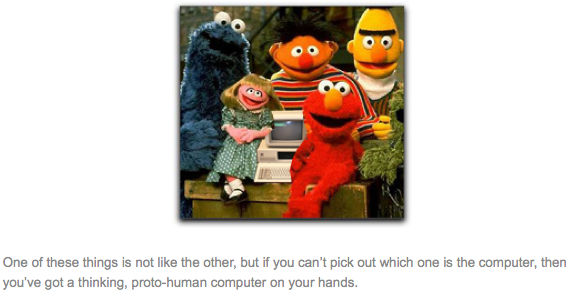
Here are some excerpts from the 2011 contest rules to show how the test works:
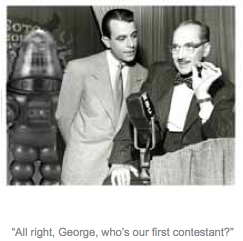 Judges will begin each round by making initial comments with the entities. Upon receiving an utterance from a judge, the entities will respond. Judges will continue interacting with the entities for 25 minutes. At the conclusion of the 25 minutes, each judge will declare one of the two entities to be the human.
Judges will begin each round by making initial comments with the entities. Upon receiving an utterance from a judge, the entities will respond. Judges will continue interacting with the entities for 25 minutes. At the conclusion of the 25 minutes, each judge will declare one of the two entities to be the human.
At the completion of the contest, Judges will rank all participants on “humanness.”
If any entry fools two or more judges comparing two or more humans into thinking that the entry is the human, the $25,000 and Silver Medal will be awarded to the submitter(s) of the entry and the contest will move to the Audio Visual Input $100,000 Gold Medal level.
Notice that both the computer entrants and the human volunteers are referred to in these rules as “entities,” a word calculated to eliminate any pro-human bias among the judges, not that such a bias exists in the world of Artificial Intelligence. In addition, the computers are called “participants,” which actually gives a bump to the machines, since it’s a term that’s usually reserved for human contestants. Since the rules sound like they were written by a computer, not by a human, passing the Turing test should be a snap for any halfway decent programmer.
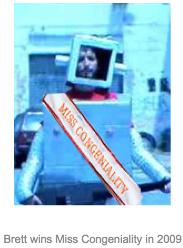 But even though these Turing competitions have been staged since 1991, when computer scientist Hugh Loebner first offered the Loebner medal for the most human computer, so far no computer has claimed the go
But even though these Turing competitions have been staged since 1991, when computer scientist Hugh Loebner first offered the Loebner medal for the most human computer, so far no computer has claimed the go

By: Michelle,
on 11/10/2010
Blog:
OUPblog
(
Login to Add to MyJacketFlap)
JacketFlap tags:
robots,
santa,
Science,
ants,
tour,
melanie,
artificial intelligence,
mitchell,
systems,
ai,
The Oxford Comment,
complexity,
*Featured,
melanie mitchell,
phi beta kappa,
science book award,
guided,
Add a tag
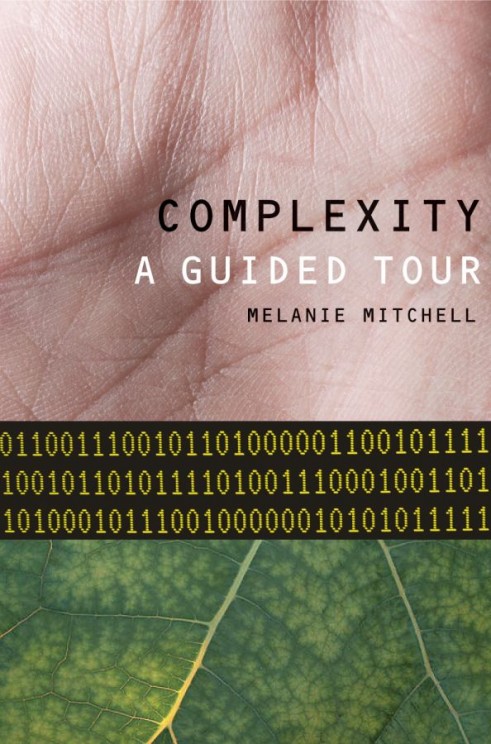 Congratulations to Melanie Mitchell, who received the 2010 ΦBK Science Book Award for her book Complexity: A Guided Tour! In honor of this, Michelle and Lauren talk with Mitchell about ants, robots, the economy, and more.
Congratulations to Melanie Mitchell, who received the 2010 ΦBK Science Book Award for her book Complexity: A Guided Tour! In honor of this, Michelle and Lauren talk with Mitchell about ants, robots, the economy, and more.
Melanie Mitchell is Professor of Computer Science at Portland State University and External Professor and Member of the Science Board at the Santa Fe Institute. Her research interests include artificial intelligence, machine learning and complex systems.
Subscribe and review this podcast on iTunes!
From the Phi Beta Kappa Society:
Amazing feats of collective intelligence, such as the colony of army ants that link themselves together to cross daunting precipices, are having an unconventional effect on the future of science. The “complexity” of these naturally occurring events cannot be explained by the traditional method of breaking science down into its most basic parts, in this case, the individual army ants. Instead, the study of complex systems, those made up of simple components with limited capacity for communication, provide a much broader illustration of the science of self-organization and adaptation.
In
Complexity: A Guided Tour (Oxford University Press, 2009), Melanie Mitchell draws on her background as a computer scientist and her work with the Santa Fe Institute to study the complex systems that have evolved in nature and how they may contribute to the future of computer programming, specifically with regards to artificial intelligence. Mitchell also looks at the human brain’s ability to create consciousness from a complex network of electrically charged neurons, axons, and dendrites, as well as the immune system’s unique collection of cells, which work together in an effective and efficient way without any central control.
The song featured in this podcast is “In the Middle” from the album Can’t You See by The Ben Daniels Band. Get it here.



By: Cassie,
on 6/11/2008
Blog:
OUPblog
(
Login to Add to MyJacketFlap)
JacketFlap tags:
Technology,
Science,
computers,
suicide,
homosexuality,
A-Featured,
alan turing,
artificial intelligence,
code breaking,
enigma,
richard dawkins,
Turing Test,
Add a tag
Richard Dawkins is the bestselling author of The Selfish Gene and The God Delusion. He’s also a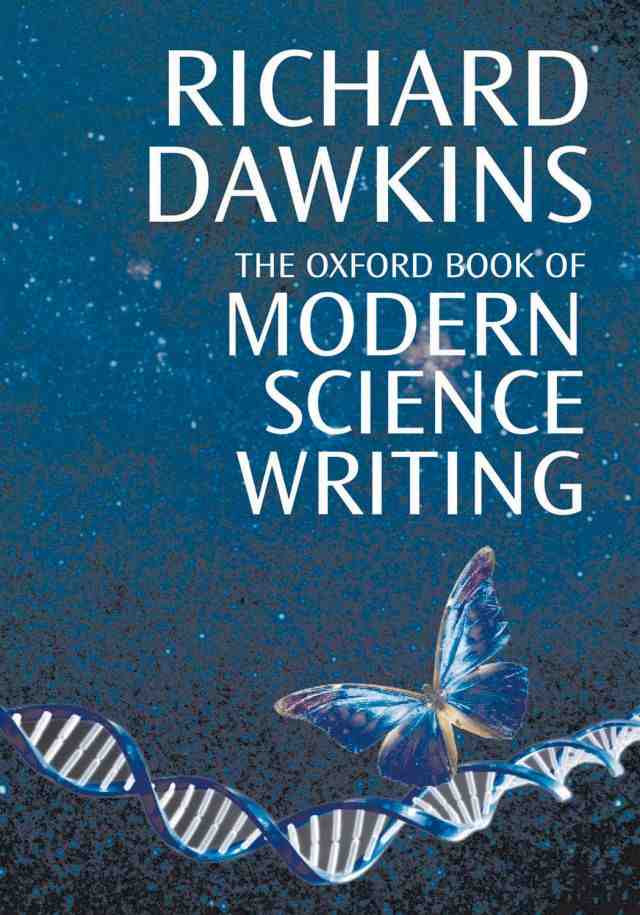 pre-eminent scientist, the first holder of the Charles Simonyi Chair of the Public Understanding of Science at Oxford, and is a fellow of New College, Oxford. Called “Darwin’s Rottweiler” by the media, he is one of the most famous advocates of Darwinian evolution. His most recent book is The Oxford Guide to Modern Science Writing, a collection of the best science writing in the last century.
pre-eminent scientist, the first holder of the Charles Simonyi Chair of the Public Understanding of Science at Oxford, and is a fellow of New College, Oxford. Called “Darwin’s Rottweiler” by the media, he is one of the most famous advocates of Darwinian evolution. His most recent book is The Oxford Guide to Modern Science Writing, a collection of the best science writing in the last century.
This is the second in a series of podcasts we’re running from an interview with Dawkins. Last time, he talked about Watson and Crick. Now, Dawkins looks at Alan Turing, one of the fathers of the modern computer. Dawkins has included a selection from Turing’s Computing Machinery and Intelligence in his book.
Transcript after the jump.
DORIAN DEVINS: Alan Turing, another British scientist, computer mathematician…
RICHARD DAWKINS: Yes. Alan Turing. Well, one of the fathers of the modern computer. So Turing was, I suppose, the nearest British approach to the father of the modern computer, apart from [Charles] Babbage in the 19th Century. Turing was the leading code-breaker in the Second World War at the Bletchley Park code-breaking establishment, which was phenomenally successful in breaking German codes. The famous Enigma code that the Germans used—the Germans never realized that their Enigma code had been broken. And the result of breaking the Enigma code was that Allied British and American generals would sometimes get German orders more or less at the same time as German generals were getting them. So it was a most extraordinarily valuable contribution to the Allied war effort. However, Turing committed suicide after the war because he was arrested for homosexual activity, and in those days in Britain, homosexual behavior was illegal. And Turing, who should have been given a medal and a knighthood, feted as the savior of his nation, was instead arrested for homosexuality and was given a choice between a two year prison sentence or being given a course of hormone injections which would have had some kind of feminizing effect and would have made him grow breasts. He chose instead to eat an apple that he’d injected with cyanide. One of the most tragic stories in British science. He was a great mathematician, a brilliant mathematician, a brilliant philosopher, and one of his contributions was the Turing Machine. Another one was the Turing Test, the hypothetical test for whether a computer could think; the so-called Turing Test, where you have a human in one room and an entity, which might be a computer and might be another human in another room, communicating by teleprinter. And the task of the real human, the subject, is to discover whether what he’s talking to is a computer or another human. The Turing Test, if the computer passes the Turing Test, what it means is that a human can’t tell the difference between the computer and another human. And the Turing Test you very often find mentioned in philosophical works about the nature of consciousness and machine intelligence.
DEVINS: It’s quite interesting to be able to read something by him, rather than just about him too.
DAWKINS: Yes. He was a real eccentric, a very, very strange man, and as I say, his downfall and his death is one of the most tragic and actually wicked stories that I know.
ShareThis
By: Stacy Dillon,
on 1/8/2008
Blog:
Welcome to my Tweendom
(
Login to Add to MyJacketFlap)
JacketFlap tags:
fairytales,
amnesia,
royalty,
Harcourt Children's Books,
rebellion,
jokes,
fairytales,
amnesia,
Harcourt Children's Books,
royalty,
rebellion,
Add a tag
 How happy was I when this gem showed up in the mail? Very happy, indeed.
How happy was I when this gem showed up in the mail? Very happy, indeed.
When you think about it, much of Marigold and Christian's happiness was based on the fact that Olympia fell in the river but never came back. Well, guess what? She's back.
Turns out that Olympia has been cooling her heels down the river in Granolha, in the home of the mayor and his wife. The thing of it is, Olympia cannot remember who she is. She has decided that her name is Angelica, and sweet Angelica in no way resembles meany Olympia. She is a good listener, and treats her friends well. All good things must end, however, and after about a year's time, Olympia remembers who she is and resurfaces in all her glory.
Her aim? To get back to Beaurivage and set her plan back in motion. She just knows that her husband King Swithbert must have messed things up by now. Soon she is ordering the people of Granolha to do her bidding, rig her up a carriage, and get her home. She brings Lazy Susan along for the ride to act as her maid. (She is still resenting her sister Beauty's castle life and wants some for herself!).
What follows is a fabulous sequel to Once Upon A Marigold that will simply delight fans. Many characters are the same, but developed more deeply. And the new characters like Mr. Lucasa are such fun! Filled with cheesy jokes, wordplay, and slapstick, this tale of friendship, family and loyalty will warm even the coldest hearts.



